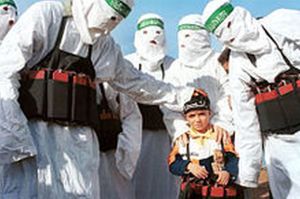“I doubt they’d accept me. There are just too many younger guys out there – I’m basically over the hill as far as Hamas is concerned.”
 Rafah, Gaza Strip, March 28 – Yusuf Hijazi looks at the towering wall between the Gaza Strip and Egypt, and wonders whether he, too, might be blocked from achieving his life’s dream. Hijazi, 15, longs to serve as a soldier in Hamas, fighting the Zionist enemy, but worries that his advanced age will dissuade the Islamist group from accepting him into its military ranks.
Rafah, Gaza Strip, March 28 – Yusuf Hijazi looks at the towering wall between the Gaza Strip and Egypt, and wonders whether he, too, might be blocked from achieving his life’s dream. Hijazi, 15, longs to serve as a soldier in Hamas, fighting the Zionist enemy, but worries that his advanced age will dissuade the Islamist group from accepting him into its military ranks.
Yusuf was born into a fighting family: his father served time in an Israeli prison for involvement in mortar fire against settlers that injured several children, and two of his three brothers – he also has a sister – were killed last summer during Israel’s incursion into Gaza to stop rocket fire at Israeli communities. Nasser, 12, and Jibril, 10, were transporting ammunition between Hamas hideouts when an IDF mortar shell hit nearby and ignited the RPG projectiles they were carrying. Yusuf, 14 at the time, had been confined to the family home to help take care of his ailing mother, and resentment still colors his voice when he recalls the war.
“It’s probably too late for me to get into Izzedin Al-Qassam,” laments Yusuf, referring to Hamas’s military wing. “Three years ago, for sure, a year ago, maybe, but now? I doubt they’d accept me. There are just too many younger guys out there – I’m basically over the hill as far as Hamas is concerned.”
As for why he did not apply for service in the military wing earlier, Yusuf explained that he had an infection that kept him infirm for a prolonged period, and was unable to function properly until a medical NGO managed to arrange care for him in an Israeli hospital. Within a month of receiving treatment, Yusuf was on his feet, but then had piles and piles of schoolwork waiting for him, keeping him out of the military training summer camps and after-school programs for boys that Hamas runs. By the time he had caught up on his academics, Yusuf was already almost 13, and an entire crop of more youthful boys was already chomping at the bit for a chance to fight Israel.
Yusuf still holds out hope that his family’s bona fides will carry the day. “My father and all my siblings have been active in Hamas since forever,” said the teen, with hope rising in his tone. “There’s got to be something I can contribute beyond looking pitiful standing in front of our collapsed home,” he added, pointing to the pile of rubble that remains of his former residence, destroyed by an Israeli airstrike when the IDF discovered it contained the entry shaft to an attack tunnel. By a rotten stroke of luck, martyrdom escaped Yusuf by a mere six minutes; he had gone to the beach to watch actual teenage recruits try to fire rockets at Israeli naval vessels.
“I can’t even gain glory as a noncombatant,” complained Yusuf. “Is it something wrong with me? Or, as I’ve been taught since day one, is there a sinister conspiracy I should be blaming? I know the correct answer, but I can’t shake the nagging feeling that I’m not worthy of being a Zionist target – even of a conspiracy, let alone an actual weapon.”




